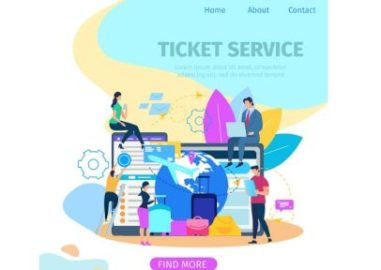Making Event Experiences that Transform with Leading-Edge Solutions

Digital innovation has massively overhauled the landscape of successful event organization and attendance in the modern digitization era. With groundbreaking solutions disrupting the event industry, there is an increase in attendee engagement, smoother operations, and valuable data insights from technological advancements that convey personalized experiences for event attendees and provides event organizers with tools to build more efficient and impactful events.
potential participants is held online, through some of the digital ticketing platforms. Lack of necessity for printed tickets means elimination of expenses on printing and delivery, as well as reduction in risks of tickets being counterfeited.
Besides that, digital ticketing systems are mobile-integrated. Hence, access to the tickets is directly through the mobile phone. With this integration, an experience that is easy and accessible to checking in at the event place is given to the holder. Real-time ticketing data and attendance enable better planning and management for the event holder.
Enhancing Attendee Engagement with Mobile Apps
Mobile applications have become indispensable tools for enhancing attendee engagement at events. Customizable event apps offer a range of features that facilitate communication, networking, and interaction. Attendees can use these apps to access event schedules, speaker information, venue maps, and more.
One of the most valuable features of event apps is the ability to send push notifications. Organizers can keep attendees informed about important updates, schedule changes, and special announcements in real-time. Additionally, interactive features such as live polls, Q&A sessions, and social media integration foster greater audience participation and engagement.
Mobile apps also provide networking opportunities by allowing attendees to connect with each other through in-app messaging and social profiles. This enhances the overall event experience by facilitating meaningful connections and interactions among participants. Additionally, integrating box office ticketing software into these apps can streamline ticket purchasing and entry processes, further enhancing the convenience and efficiency of event management.
Event Success Over Data Analytics
Data analytics is rapidly changing the world of events through deep insights that will better decisioning efforts and optimization of events. Leveraging advanced analytic tools allows organizers to collect information originating from several sources and interpret it, ultimately leading to better strategy and better results.
Identifying Effective Marketing Channels: Analysis of ticket sales data and data on participant demographics is instrumental in understanding the kind of channels that work best. This will allow the organizer to have more strategic allocation in his marketing budgets toward the most effective channels.
Enhancing Attendee Experience: Lastly, this feedback can be obtained by conducting customer feedback after the event via surveys, social media, and through applications which were made for the event. Pain points and common areas of improvement can be worked on to ensure that future events are better aligned with attendee expectations and preferences.
Optimizing Event Logistics: Optimizing event logistics with real-time data about attendee behavior, such as check-in times and session attendance, facilitate streamlined event logistics. From the information, the organizer would be in a better position to do optimal volume scheduling, crowd flow management, and enhancement of the general efficiency of the event.
Personalized content and engagement: Uncover interests through behavioral analytics to help personalize content and engagement strategies, such as creating tailored recommendations for sessions, offers, and targeted marketing messages that appeal to each event segment, for an impressive experience.
Measuring Success and ROI: Analyzing post-conference data gives a good overview of the performance of the event. Key performance indicators showing attendee satisfaction, engagement levels, and revenue generated can be measured to gauge the success of events and guide the planning of the future.
These learnings will enable the methodologies of event organizers to be transformed from raw data into actions to deliver more successful and impactful events. And the event management will always be improved and innovated based on the analytics.
Virtual and Hybrid Events
The global pandemic has accelerated the trend of the virtual and hybrid event models in how their structure changes events. Virtual events completed entirely online, or hybrid events, play a significant role in engaging wider audiences and are important in guaranteeing accessibility by combining in-person and virtual components together.
These are expected to rely heavily on state-of-the-art technologies, especially live streaming, virtual reality, and augmented reality, to ensure the success of virtual and hybrid events. Domains for live streaming allow for real-time broadcasting of the sessions of the event for remote attendees to join, no matter their location in the world. VR and AR technologies introduce very immersive experiences, thus simulating in-person attendance to create unique and engaging experiences for their online counterparts.
Hybrid events further bridge the gap between in-person and online events because one can hold on-site attendees while broadcasting to a worldwide audience. Not only is that helpful for widening reach, but it has already been shown to bring more people into your events. It also makes things so much easier for those who might not be able to make it in person. A hybrid model allows for an expended experience for all people through versatile interaction with content and speakers.

Event Management Fully Automated
Automation takes event management into a whole new perspective by easing the administrative tasks and decreasing pressure on organizers. Some of the automation is done through automated registration, ticketing, e-mail marketing, and tools that track attendees. Such tools reduce the pressure of planning an event and working it out.
These are systems including electronic and automated registration and ticketing ensuring everything is done within one conduit: the purchasing of tickets down to checking in of the attendees. This means it is time-saving and, at the same time, there is a reduced risk of errors, seamlessly creating a good experience for the attendees.
Email marketing automation allows organizers to schedule and deliver personalized emails to the attendees with the aim of informing and engaging them before, during, and after the event. It is through this that one is able to get real-time data concerning behaviors by participants and hence aid organizers to make data-driven decisions and offer improvements on logistics.
Security and compliance can be improved
Security and compliance, then, are critical to the event industry, especially in data protection and privacy. State-of-the-art solutions have advanced security features for the safeguarding of sensitive information, ensuring the needed compliance, and other important regulations like the General Data Protection Regulation (GDPR).
In modern event management platforms, primary measures of security include encryption, secure payment gateways, and identity verification. These features protect all data about attendees and reassure organizers and participants.
Compliance with data protection rules is also very important. Legal actions can be raised against businesses, thus encouraging customers to express their trust. Compliance tools within event management software aid the organizer in meeting the requirements of the law to ensure data are secure and handled with clarity.
Conclusion
It makes your event experiences cutting edge, thereby keeping you competitive in the ever-evolving industry of events. All these technologies, from digital ticketing and automation in data analytics to automation in totality, are improving the entire process of the event planning and implementation process.
Event professionals embracing these innovations create memorable experiences, engagement, and efficiency tailor-made for today’s tech-savvy audiences. With the continued advancement of technology, there exists no limit to how event experiences can be made better. Technology will further unlock a future with newer, more dynamic opportunities for interacting, accessing, and impacting events.
